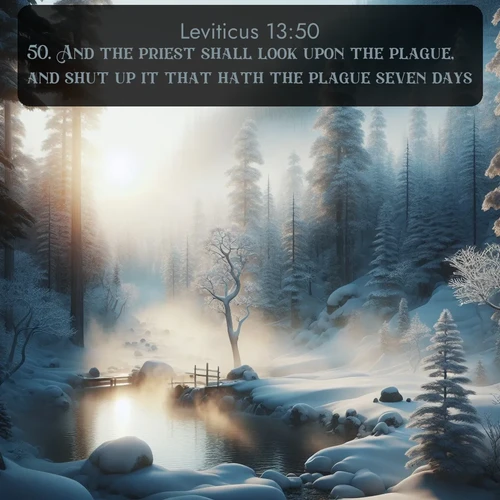Leviticus 13:50 plusieurs versions / traductions
English Bible Translations
50. And the priest shall look upon the plague, and shut up it that hath the plague seven days:
50. And the priest shall look upon the plague, and shut up [that which hath] the plague seven days:
50. And after it has been seen by the priest, the thing which is so marked is to be shut up for seven days:
50. And the priest shall look on the sore, and shall shut up [that which hath] the sore seven days.
50. And the priest shall look upon the plague, and shut up that which hath the plague seven days:
50. `And the priest hath seen the plague, and hath shut up [that which hath] the plague, seven days;
German Bible Translations
50. Und wenn er das Mal besehen hat, soll er es sieben Tage lang einschließen.
French Bible Translations
50. Le prêtre examinera la plaie et enfermera pendant 7 jours ce qui en est attaqué.
50. Le sacrificateur examinera la plaie, et il enfermera pendant sept jours ce qui en est attaqué.
50. Le sacrificateur examinera la plaie, et il enfermera pendant sept jours ce qui en est attaqué.
50. Et le sacrificateur verra la plaie, et il fera enfermer pendant sept jours l'objet où est la plaie;
50. Et le Sacrificateur regardera la plaie, et fera enfermer pendant sept jours [celui qui a] la plaie.
50. Le sacrificateur examinera la plaie, et il en enfermera pendant sept jours ce qui a la plaie.
Versions with Strong Codes
Leviticus 13 / KJV_Strong50. And the priest[H3548] shall look upon[H7200] [H853] the plague,[H5061] and shut up[H5462] it that hath[H853] the plague[H5061] seven[H7651] days: [H3117]
Strong Code definitions
H3548 kohen ko-hane' active participle of H3547; literally, one officiating, a priest; also (by courtesy) an acting priest (although a layman):--chief ruler, X own, priest, prince, principal officer.see H3547
H7200 ra'ah raw-aw' a primitive root; to see, literally or figuratively (in numerous applications, direct and implied, transitive, intransitive and causative):--advise self, appear, approve, behold, X certainly, consider, discern, (make to) enjoy, have experience, gaze, take heed, X indeed, X joyfully, lo, look (on, one another, one on another, one upon another, out, up, upon), mark, meet, X be near, perceive, present, provide, regard, (have) respect, (fore-, cause to, let) see(-r, -m, one another), shew (self), X sight of others, (e-)spy, stare, X surely, X think, view, visions.
H853 'eth ayth apparent contracted from H226 in the demonstrative sense of entity; properly, self (but generally used to point out more definitely the object of a verb or preposition, even or namely):--(as such unrepresented in English). see H226
H5061 nega` neh'-gah from H5060; a blow (figuratively, infliction); also (by implication) a spot (concretely, a leprous person or dress):--plague, sore, stricken, stripe, stroke, wound. see H5060
H5462 cagar saw-gar' a primitive root; to shut up; figuratively, tosurrender:--close up, deliver (up), give over (up), inclose, X pure, repair, shut (in, self, out, up, up together), stop, X straitly.
H853 'eth ayth apparent contracted from H226 in the demonstrative sense of entity; properly, self (but generally used to point out more definitely the object of a verb or preposition, even or namely):--(as such unrepresented in English). see H226
H5061 nega` neh'-gah from H5060; a blow (figuratively, infliction); also (by implication) a spot (concretely, a leprous person or dress):--plague, sore, stricken, stripe, stroke, wound. see H5060
H7651 sheba` sheh'-bah or (masculine) shibrah {shib-aw'}; from H7650; a primitive cardinal number; seven (as the sacred full one); also (adverbially) seven times; by implication, a week; by extension, an indefinite number:--(+ by) seven(-fold),-s,(-teen, -teenth), -th, times). Compare 7658. see H7650see H7658
H3117 yowm yome from an unused root meaning to be hot; a day (as the warm hours), whether literal (from sunrise to sunset, or from one sunset to the next), or figurative (a space of time defined by an associated term), (often used adverb):--age, + always, + chronicals, continually(-ance), daily, ((birth-), each, to)day, (now a, two) days (agone), + elder, X end, + evening, + (for) ever(-lasting, -more), X full, life, as (so) long as(... live), (even) now, + old, + outlived, + perpetually, presently, + remaineth, X required, season, X since, space, then, (process of) time, + as at other times, + in trouble, weather, (as) when, (a, the, within a) while (that), X whole (+ age), (full) year(-ly), + younger.
Prédications qui analysent les thèmes Lévitique 13
Thèmes : Lèpre et maladies cutanées; Règles de purificationRelated Sermons discussing Leviticus 13
Themes : Lèpre et maladies cutanées; Règles de purificationsee also: Bible Key Verses ; KJV Bible Images, BBE Bible images

